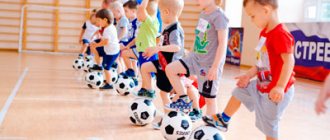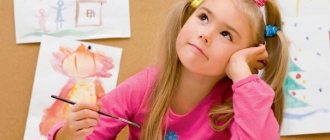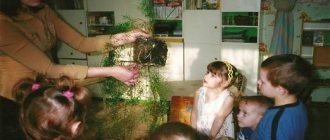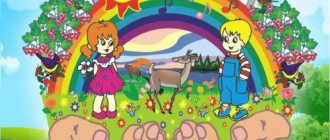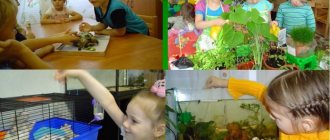Scientific article “Features of economic education of preschool children”
Features of economic education of preschool children
The prerequisites for the economic education of preschoolers are laid in early preschool age. From an early age, a child must be taught to be neat and careful with toys and various objects. At the age of five or six, such work continues and becomes more focused.
In practice, we observe that by the age of six or seven, children have accumulated some experience in energy saving: they know that they need to turn off the water and electricity. Preschoolers notice if someone has not turned off the water after themselves. However, it should be noted that the level of economic development of children by the time they enter school is unequal. This depends not only on the individual characteristics of the children, but also on a number of other circumstances. Educators do not always manage to establish contact with parents. And as a result of unequal educational influences on a preschooler, he develops a different style of behavior in kindergarten and at home. The child often does not understand why it is forbidden to leave the bread crust (at home this is allowed), why it is necessary to save water (at home water flows from the tap while mother is in the kitchen), etc.
Sometimes parents underestimate the role of special economics classes; they say that when their children grow up, they will start saving. That is why children come to school with different levels of economic ideas. Mastering the norms of economics is carried out in various activities of children in kindergarten. They are included in it by adults (conversations, games, activities, work), as well as in everyday life, when, as a result of the analysis of certain actions of individual pupils, ideas about kindness, justice, frugality are clarified, feelings develop, motives of behavior are formed, positive experience accumulates behavior in kindergarten and at home.
The criterion for a person’s economic education, as is known, is his behavior, i.e., the set of actions he performs in familiar or changing conditions. The economic education of a person permeates his emotional and motivational sphere, the development of which largely depends on knowledge, judgments (ideas) about what it means to be economical, thrifty and kind, attentive, polite.
In practice, observing the play activities of preschoolers and analyzing the questions asked, we are faced with the fact that they are interested in very serious problems related to economic content. The most common among them are: “Why are the prices for the same goods different?”, “Why does everyone get different salaries?”, “Can everything be bought with money?”, “What to do when there is no money?”, “Why Mom doesn’t buy toys like other children?” etc. Very often in the speech of children we hear the words: “advertising”, “exchange”, “businessman”, “bank”, etc., the meaning of which many do not know. The reason for the “economic” curiosity of preschoolers lies in the penetration of economics into all spheres of people’s lives and, above all, into the life of the family, where the child at every step is faced with economic problems discussed by members of his family.
As prerequisites for economic upbringing and education, one can highlight previously acquired knowledge in the field of economics, curiosity and keen interest, the presence of an outlook, a high level of conceptual thinking, and the child’s readiness to master economic knowledge. Moreover, the latter should not only be accessible to children, but also correspond to their interests and level of thinking, personality traits necessary in one or another economic activity and manifest themselves in the play and work activities of preschoolers.
According to A.D. Shatova preschoolers should know everything about labor and everything connected with it: production, means of production, means of circulation, simple cooking technologies, making toys, monetary units and their purpose, value and cost, insurance and taxes, various professions, etc. .
Using the entire variety of forms of organizing the educational process will help the teacher make the process of economic education interesting, creative, and accessible to preschoolers.
One of the main forms of organizing economic education for preschool children is the occupation
, often combining mathematics, speech development and the world around us at the same time, the so-called integrated lesson. Classes introduce children to basic economic categories and introduce them to economically feasible behavior. In the process of solving logical and arithmetic problems, children’s interest in acquiring economic knowledge increases and a desire for self-development is observed. Classes broaden their economic horizons, clarify preschoolers’ ideas, introduce them to new prestigious professions, allow them to understand the role of work in a person’s life, the specifics of commodity-money relations and advertising, teach them to spend money wisely, take care of things (toys, clothes, shoes) and natural resources.
In classes to familiarize yourself with the outside world, it is necessary to plan solutions to the problems of economic education. With children, it is important to find out the conditions for caring for nature, natural resources, the environment, flora and fauna.
Children should be taught economics not using the usual traditional methods, but through play, competition, communication with fairy tales, and oral folk art.
To develop efficiency, thriftiness, and ingenuity, you can play the games “Income from waste” (about the use of waste materials in games), “Shop”, “Hairdresser”, “Atelier”, etc.
In applique classes, you can use templates depicting geometric shapes, followed by the task of arranging the shapes on a sheet of paper so that there is as little waste as possible.
Manual labor classes are important components of economic education, because Productive activities represent great opportunities for forming the foundations of economic thinking.
A.V. Beloshistaya points out that the mathematical development of children is, first of all, aimed at their mastering subject-specific (mathematical) content, the formation of cognitive and creative abilities. Mathematics equips a child with the means of rational knowledge of the world. Counting, measuring, and elementary calculations are the methods that a child uses to solve various problems, including economic ones. The use of these methods in cognitive and practical activities stimulates search and opens the path to creativity for the child. Mathematical knowledge can be considered as the basis for the development of elementary economic concepts in older preschoolers. At the same time, familiarization with the economic sphere of reality contributes to the child’s transition from the formal acquisition of mathematical knowledge to their conscious application in a new area.
The pedagogical value of fairy tales as an effective means of cognitive development of a preschooler lies in the possibility of developing knowledge in children, including economic knowledge, in an accessible and entertaining form. Children love to listen to fairy tales, both traditional folk ones, and original ones, and those invented by the teacher for a predetermined purpose. By the way, any familiar fairy tale can be modified, economic situations can be introduced: purchase and sale, payment of labor, cash loan, installment plan, etc. Entertainment, dramatization of economic fairy tales, leisure evenings, competitions, holidays, quizzes are, as a rule, general in nature and are used to consolidate and systematize knowledge, develop economic thinking. Reading fiction helps to highlight the motivations and actions of the characters and characterize their actions, forms the vocabulary of children, and most importantly, it will provide an explanation for many incomprehensible economic phenomena.
E. A. Kurak, L. A. Mikherev recommends, in addition to activities with children, to conduct games
(role-playing, didactic, theatrical) with economic content, reading fiction (“The Fly-Tsokotukha”, “The Three Little Pigs”, “Puss in Boots”, etc.), solving problem situations that arise both in literary works and in real life, modeling economic situations, quizzes, competitions, etc. Thus, solving problem-game situations trains children in the ability to solve practical problems, navigate the surrounding reality, thereby contributing to the formation of economically literate behavior.
T.G. Khanova, N.M. Prokofiev believe that play, being the leading activity of a preschooler, allows a child to become familiar with the world of commodity-money relations, master complex economic categories (price, demand, advertising, credit, business, etc.), and gain and consolidate new knowledge in an entertaining way. In short, independent and creative play makes economics accessible to children. “Advertising games” are interesting, where children are asked to advertise various toys and objects, emphasizing their functionality and attractiveness.
Role-playing games
help make economics more understandable. Thus, by playing the role-playing game “Professions”, children comprehend the meaning of work, reproduce the labor processes of adults and at the same time “learn” economics. In plot-based didactic games, real life situations are simulated: purchase and sale operations, production and marketing of finished products, etc. The combination of educational-game and real-life activities is most effective for preschoolers to master complex economic knowledge.
In the games “Confectionery Factory”, “Studio for Little Beauties”, “Advertising Agency”, “Currency Exchange Office”, “House Construction”, “Meeting Room”, “Supermarket”, etc., the most favorable conditions are created for the development of children’s interest to economic knowledge, a natural environment close to reality, a psychologically age-appropriate communication situation is established.
The process of children communicating with each other and with adults in joint play activities is accompanied by positive emotions, which stimulates their cognitive activity and promotes the development of thinking. The combination of educational games and real activities is most effective for preschoolers to master complex economic concepts.
Children also gain ideas about economics and economic concepts in everyday life, when they go with their parents to the store or to the market. Children see a product, know its price, see how their parents pay at the checkout or with the seller, hear the words “cheap”, “expensive”, “money”, “price”, “earn money”.
Thus, at the present stage it is necessary to increase the level of economic ideas of children of senior preschool age, therefore it is important to begin the formation of an economic culture from an early age, in order to increase the general cognitive activity of children, fostering such qualities as frugality, independence, business activity, and the ability to defend one’s point of view .
Economics and preschooler
The economy and the preschool child seem too far apart only at first glance. Understood as the field of "wise housekeeping", the art of economics can be taught to children in the form of elementary information:
- Teach them the correct attitude towards money, how to earn it and use it wisely;
- use games, economic problems, crosswords to introduce children to the complex world of objects, things and human relationships
- The connection between economic and ethical categories: Labor, goods, money, value, price, on the one hand, and moral categories: “thrift, honesty, frugality, dignity, generosity,” on the other.
- teach how to properly treat advertising and deal with it;
- behave correctly in real life situations, develop significant needs.
The child participates in economic processes. He goes to the store with his parents, sometimes he does the shopping himself, and whether we like it or not, he still has economic experience. Therefore, the teacher’s task is not only to convey a certain amount of economic knowledge, but, very importantly, to teach how to correctly apply this knowledge, that is, to educate an economist.
Based on the above, A.A. Bogdanov proposes to include the following key topics in the economic education program for preschoolers:
- my country and family.
- family income.
- family cost.
- current and future family budget.
- family savings and their use.
As a result, according to A.A. Bogdanov, a preschooler should:
- Know the basic economic concepts and categories covered in class;
- Be able to weigh your needs and capabilities; Understand that money “grows” when it is kept in a bank (and not in a piggy bank); To feel that their family is involved in the development and strengthening of the state and that there is an inextricable connection between them;
- learn that wages are payment for the quantity and quality of labor and a pension for past work, and alimony is an advance paid to children in anticipation of their future work; that family expenses should not be wasteful, and a thrifty child can increase them, that advertising, if true, can help and, conversely, harm the family budget; that family savings are money that can remain if spent wisely, and can be used for a vacation for the whole family or buying necessary but expensive things, etc. P.
- Realize your importance for family and society; responsibility for one’s actions, which may positively or negatively affect the economic situation of the family and oneself.
Scientists of the Russian Academy of Education have developed and adopted a unified concept of economic education for children and adolescents, according to which education begins from preschool age.
A. Shatova’s program “Preschoolers and ... Economics” seeks to lay the foundations of an economic way of thinking, an awareness of what “I” is in the world of economic values and how to behave in it. Already in preschool age, the child moves from the usual role of a carefree consumer to a conscious consumer, and then to the creator of consumer goods. This is the key to a new way of thinking and a new attitude towards life.
The process of formation of economic thinking
An analysis of psychological and pedagogical literature shows that the problem of the content of economic education for preschool children is complex and ambiguous. In fact, economic education as a process of forming economic thinking, developing business qualities, social activity and entrepreneurship is only partially applicable to preschoolers, due to the age-related characteristics of their mental development.
HELL. Shatova believes that “the purpose of labor in economic education is to instill in children the correct attitude towards what adults have done and are doing for them, respect for human labor, thanks to which an “objective world that ennobles life” has been created.”
Economic education of preschool children should emphasize its relationship with moral education. In conditions of capitalization of the economy, the younger generation’s ideas about justice and honesty often shift towards permissiveness, materialism, selfishness and the desire to get rich at any cost.
The period of senior preschool age is the most favorable for the formation of the first ideas about the moral and legal foundations of the market, which, according to B.T. Likhachev, “are the simple rules of human morality”: Honesty, strength and reliability of a given word; politeness, respect for employees, partners, and consumers.”
For the effectiveness of the process of economic education of children of senior preschool age, researchers have determined optimal pedagogical conditions. Let us dwell on the first condition - the creation of an economically educational environment aimed at the formation of such moral and economic qualities of the individual as thrift, responsibility, business sense, entrepreneurship, ensuring life in society.
Based on the research of I.I. Pidkasisty, the environment of economic support is understood as a set of phenomena and events that surround the child, influence his personal development and contribute to his entry into the world of socio-economic relations.
The contents of an economically supported environment include:
- object-spatial environment (creation of a gaming economic zone);
- socio-behavioral environment (parents, teaching staff of a preschool educational institution);
- event-cognitive environment (excursions, meetings with interesting people);
- Information environment (crosswords, illustrations, layouts of stores, banks, service centers, coin samples, map of industrial enterprises of the city).
A teacher who professionally uses the influence of these social agents gives this influence a target orientation, transforming the social situation of development into a pedagogical one - creating an educational environment aimed at the formation of leading moral and ethical qualities.
In preschool age, moral feelings begin to form, which are important for the development of decent relationships. The sincere attitude of adults towards someone or something soon turns into the attitude of children towards the same persons and phenomena, expressed in corresponding morally oriented feelings. There is an active desire to help and support each other. The emergence of friendship between children and a caring attitude towards each other occurs on the basis of the first forms of a sense of duty and responsibility.

